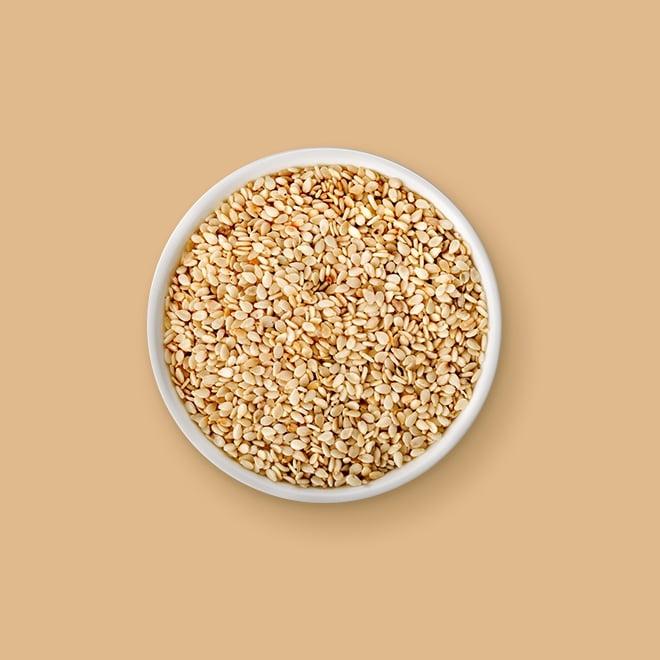Sesame




Sesame is a flowering plant cultivated for its edible black or white seeds. Sesame has an intensely rich, nutty flavor and is used in different ways around the world.
Sesame seeds have a very high oil content. Due to sesame oil’s distinct flavor, do not use it to cook, but rather use it sparingly to elevate the taste of your dressings, sauces and condiments.
Sesame seeds are used in many cuisines, but especially those in the Middle East and Mediterranean regions, such as Greece, Turkey, Lebanon and Iran to name a few. Tahini, ground sesame seed paste, is an essential ingredient for making dips, such as hummus and baba ganoush, candies, like halva, and drizzled on top of meat and vegetable dishes.
When selecting sesame seeds from bulk bins, try to make sure that the store has a good turnover rate of products to ensure freshness. Give the bins a quick smell to ensure they smell fresh and not rancid.
When buying sesame seeds, make sure that there is no evidence of moisture as it probably means the seeds are rancid
Store sesame seeds, oil, and paste in a cool dry place or in the refrigerator
Sesame oil is a natural moisturizer and can be used to reduce wrinkles, lighten sun spots or irregular pigmentation, and even protect your skin from the sun
Sesame oil makes a great massage oil. It helps to strengthen body tissues and reduce stress
Sesame oil can also be used on the scalp to increase hair growth, moisturize dry scalps, and add a quick shine
Sesame seeds are a major food allergen, allergic reactions to sesame range from itchy skin and runny nose to anaphylactic shock, which causes difficulty breathing and swelling in the mouth and throat
Sesame oil is a common ingredient in cosmetic and pharmaceutical products such as lotions, lip products, and ointments
You can toast sesame seeds using the oven by spreading the seeds on baking sheet and baking for 5-10 minutes at 350 °F, stirring occasionally
You can also toast sesame seeds using the microwave, place the seeds on a microwave-safe plate and spread a little vegetable/canola oil (about a half-teaspoon) onto the seeds. Microwave in one minute intervals, occasionally stirring, until golden
To use the stove, heat a small pan over medium-high heat. Add the sesame seeds and stir continuously until golden brown
Throw a handful of sesame seeds into your batter next time you bake bread, muffins, or cookies
Sesame seeds and lemon juice make a great topping for freshly steamed veggies
Try tahini paste with honey or with miso and olive oil spread on toast
Combine toasted sesame seeds with rice vinegar, soy sauce and crushed garlic for a tasty salad dressing or marinade
Substitute sesame oil in place of your usual oil for your next marinade
Sesame seeds are are high in dietary fiber and are a good source of Vitamin B6, thiamin, calcium, folate, iron, magnesium, copper and manganese
The Phytosterols found in sesame seeds are known to lower blood cholesterol, enhance immune responses, and decrease risk of certain cancers
Corrections or improvements? Email us at
content@sidechef.com